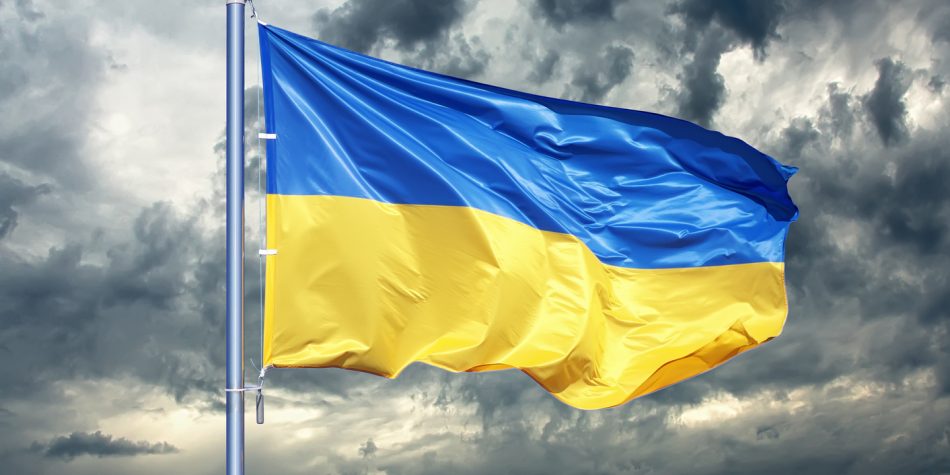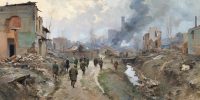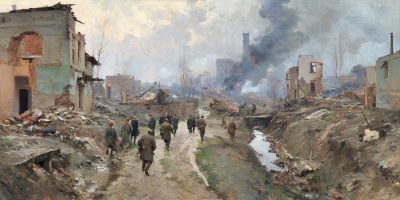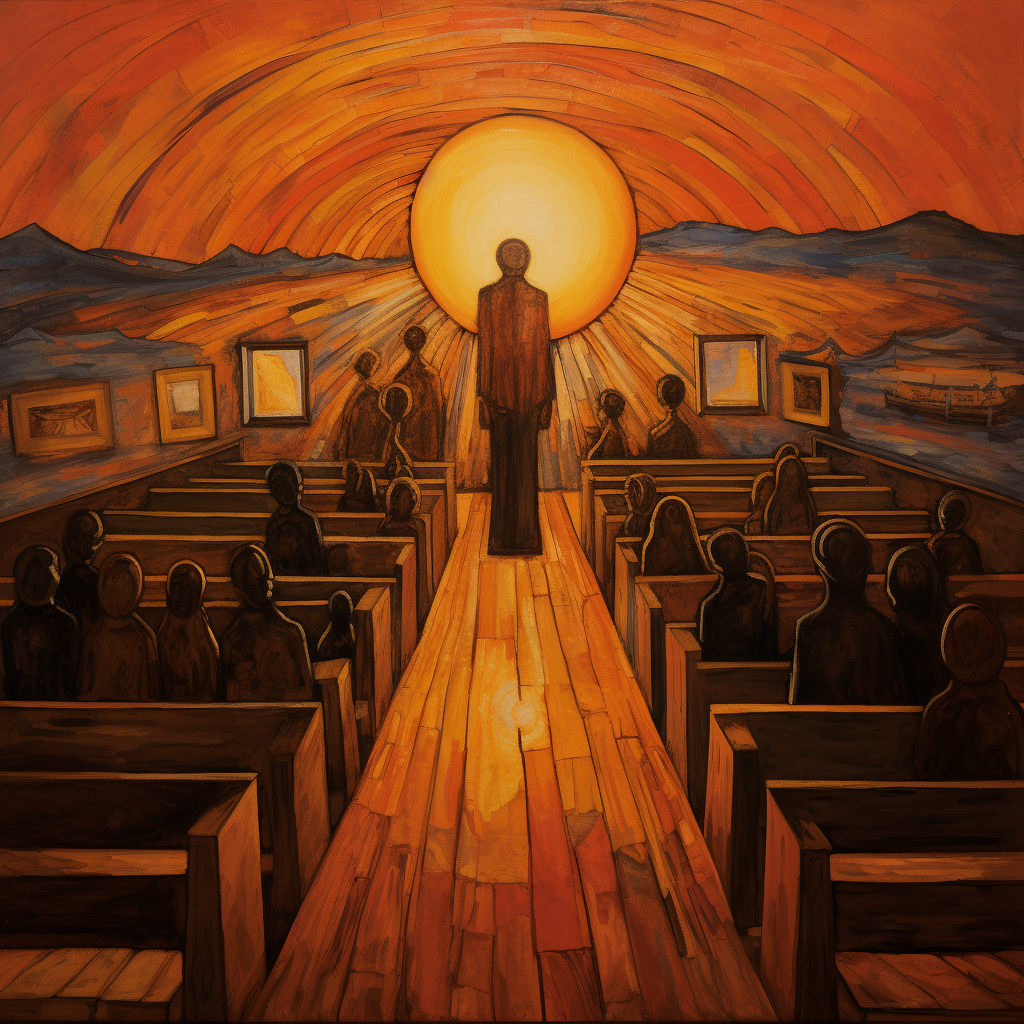On New Year’s Eve, I reconnected by phone with a friend from Kyiv. It has been 18 years since Sasha (not his real name) and I preached the gospel of peace on the now war-torn streets of eastern Ukraine.
Earlier in 2022, Sasha fought in the battle for Izyum. Shrapnel from a rocket strike landed him in a hospital for four months—two of which he spent in a coma. He tossed aside my praise of his military service.
“It’s a slaughterhouse,” he said.
Our 46-minute conversation was, for me, saturated in sorrow. Sasha is divorced. His parents are dead. He lives alone.
Meanwhile, outside his windows in Kyiv, the sights and sounds are pure horror. Rockets and exploding drones. The eternal wail of air raid sirens. The country averages 47 air raid alerts per day.
Unlike Sasha, I’ve never served in the military. But because I’ve followed the blow-by-blow of the conflict in Ukraine from the chilling Maidan massacre of February 2014 to the present, war feels familiar to me. My ears can distinguish the solitary crack of sniper fire from the drum-like cadence of machine gun rounds. I can also differentiate the whistling scream of incoming missiles from the motorbike engine sound of exploding drones.
I can’t help it. A part of me is still (and forever will be) in Ukraine’s Russian-speaking east. I root for a Ukrainian victory in the spirit of a sports fanatic.
But sometimes, I wonder when enough is enough. Talking to Sasha was one of those moments. Another was a recent report from gutsy Vice News journalists. Their cameras show horrifying footage from the eastern frontline city of Bakhmut (a 90-minute drive southeast of Sasha’s battle in Izyum). Reminiscent of scenes from Tolstoy’s War and Peace, we see Ukrainian soldiers in delirious, vomitous agony being treated for shrapnel wounds. Innocent civilians sprint for the bomb shelter at the whistle of an incoming missile.
A Book of Mormon story comes to mind.
Circa 145 B.C., King Limhi’s outnumbered Nephites are picking up the pieces after the corrupt government headed by his father has fallen. They are smarting from a bloody battle (caused by a misunderstanding) with the multitudinous Lamanites. The king’s military chief, Gideon, gives this counsel: “it is better that we should be in bondage than that we should lose our lives; therefore, let us put a stop to the shedding of so much blood.”
It seems that everyone—including Vladimir Vladimirovich Putin—has been surprised by the steel will of Ukrainian resistance. Those of us who lived among Ukrainians—and who know something of their long history under Soviet oppression—are less surprised. In the past year, no Ukrainian I know has voiced agreement with Gideon’s view that bondage (in their case, to Putin’s hegemon) is the greater short-term good.
They know better. They or their ancestors lived under Stalin, who starved them by the millions. Putin is Stalin in a Brioni suit.
The Book of Mormon Says More About War
The Book of Mormon has so much more to say about war than that one sentence from Gideon. Its most important teachings focus on peace.
- “The spirit of contention is not of me, but is of the devil.” ~Jesus
- “Every man should love his neighbor as himself.” ~Alma
- “[Do not] have a mind to injure one another, but to live peaceably.” ~King Benjamin
But, as is the case with most of recorded history, in the Book of Mormon, war is the norm, peace the exception.
That’s why the book’s prophets sanction self-defense. The text’s opening story is of a family that falters in finding footholds of love. A younger sibling (Nephi) outshines his older brother (Laman). Nephi has moments of self-righteousness and falling short. But Laman’s unchecked envy turns to murderous hate. When their father dies, an irreparable fracture develops. They divide into two groups that become civilizations—Nephites and Lamanites.
Nephi promptly creates a stockpile of weapons patterned after the sword of a relative named Laban. Nephi knows his people will need to defend themselves.
The original sword of Laban becomes an important symbol of the unfortunate need in this world for self-defense. The sword is passed down—along with scripture and a divine compass—through the generations.
During an especially difficult period of bloodshed later in their history, we read that the Nephites “were sorry to take up arms against the Lamanites, because they did not delight in the shedding of blood.” But what choice did the Nephites have? “They could not suffer to lay down their lives,” the text continues, “that their wives and their children should be massacred by the barbarous cruelty of those who were once their brethren.”
The Nephites at that time were led by an extroverted, no-nonsense leader named Moroni under a banner with these words: “In memory of our God, our religion, and freedom, and our peace, our wives, and our children.”
Moroni’s steady zeal brings to mind the gumption and boldness of Ukrainian President Volodymyr Zelenskyy.
Pacifism as a Path to Peace?
What of pacifism? Book of Mormon prophets sympathize with it but recognize its proximate impracticality.
The text’s most famous pacifists are the fruit of a yearslong missionary effort led by Ammon, a Nephite. Thanks to Ammon and his missionary colleagues, Lamanites in seven lands join the people of Nephi. Their conversion is unique. As a people, they change their name. They change their lifestyle. They become friendly and hard-working. Most consequentially, they refuse to defend themselves when their brother Lamanites attack them for their betrayal. They had witnessed and participated in the Lamanites’ murderous ways. For them, the taste of bloodshed—even in self-defense—had become too bitter.
In what is surely one of the most potent symbols of pacifism in any sacred text, these former Lamanites bury their weapons “deep in the earth.” One can hear notes of Isaiah’s vision of a time when the masses will convert swords into plowshares.
At the next battle, more than 1,000 of these converts lose their lives because of this commitment—even “[praising] God … in the very act of perishing under the sword.”
This is admirable and inspiring. But is it sustainable? The remainder of these pacifists is blessed to keep on living because the Nephites surround them with military protection.
And thus, we see the limits of pacifism. Even in the Book of Mormon, it can’t survive unless protected by a strong military.
A warless world is a beautiful ideal. “Would it not be marvelous if we did not have to have [weapons]?” Margaret Thatcher boldly opined on Soviet television in 1987. “But we can only get to that stage when we have more trust and confidence in one another. That means much more open societies.”
Meanwhile, some say Ukraine should take a page from pacifism and give in to Russia’s barbaric demands. As the New York Times asked, “The bloodshed continues. When is it time to talk?”
To which my friend Sasha counters, “Can you negotiate with terrorists?”
And yet one wonders, as do I: When does self-defense become self-defeating? Since Russia first invaded in 2014, Ukraine has lost tens of thousands of soldiers and civilians. And there are the millions who have fled the country for safety—millions who may, the longer the conflict lasts, never return.
Fight (and often die) for complete liberty or resign oneself to a stalemate where some of its citizens remain under the bondage of Russian occupation? That is the impossible choice Ukraine must make.
Faith-Fueled Miracles
The Economist tells us that at least two books are a part of President Zelenskyy’s morning routine. One is a Ukrainian history, the other a World War II account of Hitler and Stalin. These reads make sense for a man trying to protect his nation’s identity from a thug’s megalomaniacal whims.
What would the war be like if Mr. Zelenskyy’s morning routine included a sacred text such as the Book of Mormon? If the country’s leader sought guidance from a text that a prophet called “the most correct of any book on earth,” would Ukraine capitulate or continue the fight?
Mr. Zelenskyy, who says he was raised in an “ordinary Soviet Jewish family” under atheistic communism, fosters a private belief in God.
“I speak with [God] only in those moments which are personal for me and important, and where I feel comfortable in those places,” Mr. Zelenskyy says.
This makes sense. Zelenskyy is not an Orthodox Jew. Because of the unofficial policy of state atheism, “most Jewish families in the Soviet Union were not religious,” he says.
But this gets at the heart of what he and his fellow Ukrainians are fighting for today—liberty, including liberty in the things of God. Modern Russia is not a land of religious liberty.
The faith of Zelenskyy’s fathers and mothers urges a more open approach to faith.
“These commandments that I give you today are to be on your hearts,” the Hebrew Bible says. “Talk about them when you sit at home and when you walk along the road, when you lie down and when you get up. Tie them as symbols on your hands and bind them on your foreheads. Write them on the doorframes of your houses and on your gates.”
An outnumbered Ukraine defeating the Russian Goliath would be a miracle. Fortunately, we live in a day of miracles.
“Has the day of miracles ceased?” asks Mormon. “Behold I say unto you, Nay.”
But the prophet’s next nine words are critical: “for it is by faith that miracles are wrought.”
What Zelenskyy and his people want to do—and what the United States, Britain, and others are helping them accomplish—cannot be done with Western weapons alone.
The spirit and faith of the Ukrainian people are what may prove decisive. May we not forget this in calculating this precious nation’s future—and that of us all. “The preaching of the word … [has] a more powerful effect upon the minds of the people than the sword,” the prophet Alma says.
Miracles may take many forms, not all of which we expect. However they look, they require faith in the omnipotent God who, both the Bible and Book of Mormon say, promises to fight our battles

















